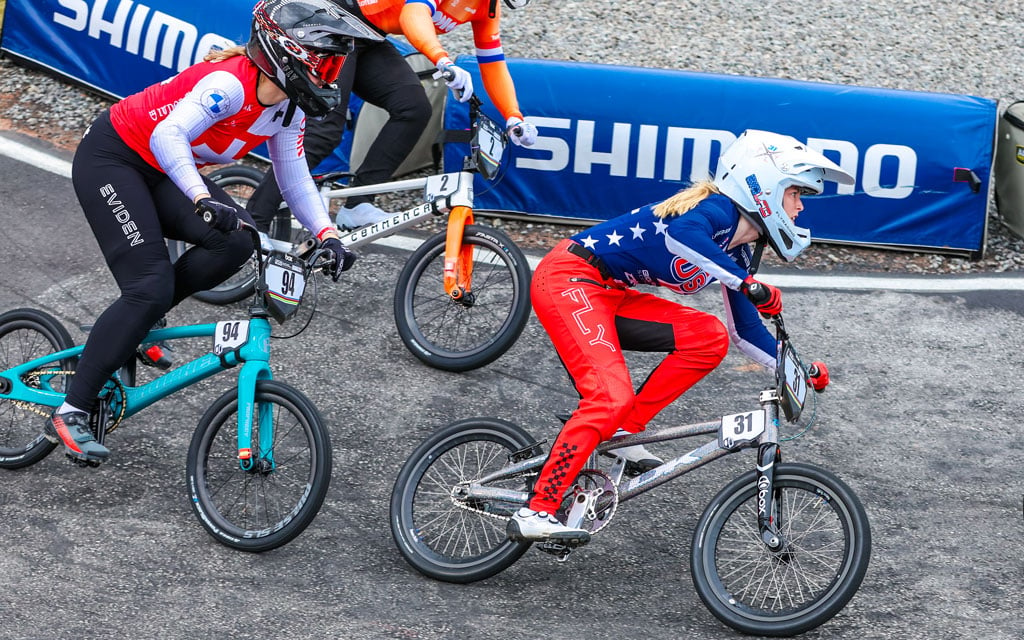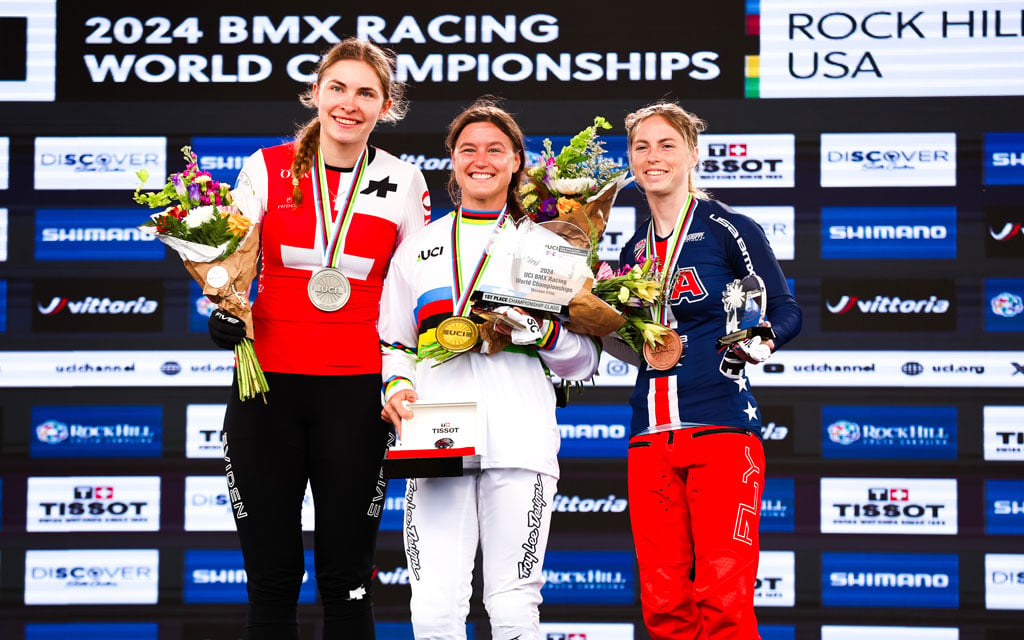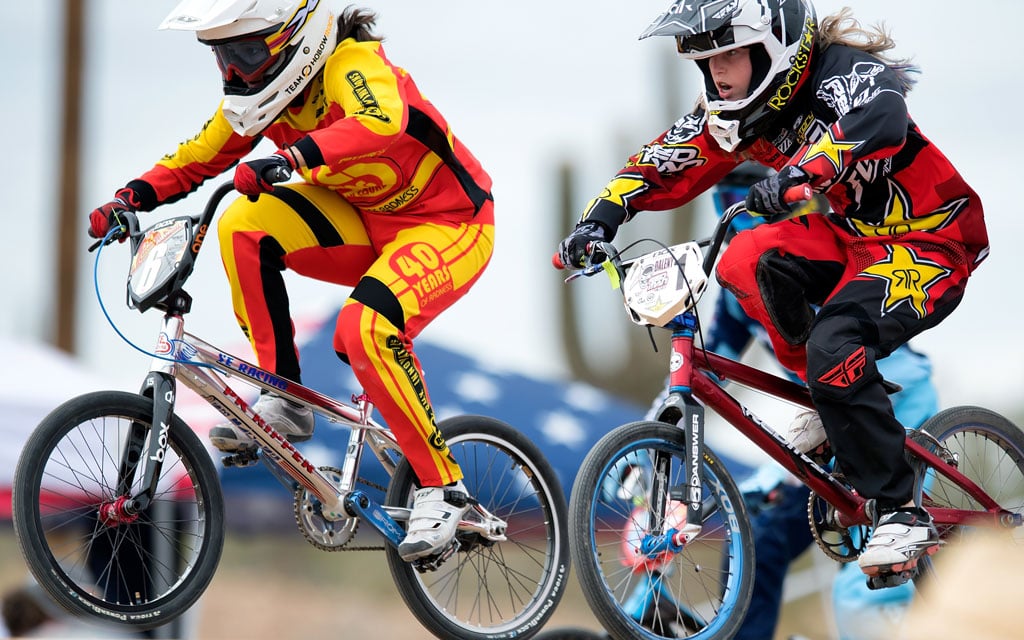
Tucson’s Daleny Vaughn leads a pack of riders during the UCI BMX Racing World Championships. She is on her way to the Paris Olympics due in part to great family support. (Photo by David Jensen/Icon Sportswire via Getty Images)
PHOENIX – For an athlete to make it to the Olympics, it takes a village. Trainers push, facility managers open doors at odd hours and coaches endure almost as many sleepless nights as the athlete.
To be an Olympian requires an ecosystem.
For Team USA BMX rider and Tucson native Daleny Vaughn, her ecosystem is a bit closer to home.
Her parents, Julie and Kirk Vaughn, have supported her growth through the sport her entire life. Her home course is Tucson Sports Park BMX and the owners and facilities managers that allowed her the hours of training … are also Julie and Kirk Vaughn.
“I don’t know that I would be where I am right now if I didn’t have that opportunity of them having the track,” Daleny, 23, said. “I think that it allowed me to be able to get much better on my bike and learn a lot of skills and it gave me an opportunity that not a lot of people have.”
They’ll have a chance to see her perform as an Olympian beginning Aug. 1, when she competes in the Paris Games at the Saint-Quentin-en-Yvelines BMX Stadium.
Thanks to her older brother Dylon, Daleny’s first experience riding was more accelerated than most. She was set free on a bike and never looked back.
“She started racing when she was 3,” Kirk said. “She was out in our front yard at one of our houses and she had training wheels on her bike. I looked out, and her older brother was taking off the training wheels and was pushing her down the street. I’m like, ‘Oh my gosh.’ We went running out there and she was pedaling. And from there on she was always out there.”
As she grew older Daleny began learning new jumps and facing new challenges against her friends and others, not only at the BMX park but in the family’s backyard as well where they had a mini-track. Although she was afforded the opportunity to race against more experienced riders at a younger age than most, her learning wasn’t as traditional as others.
She learned through losing.
A strong motivation
Even when she didn’t succeed, that never dampened her love for the sport. If anything, it fostered an ultra-competitive spirit that would be the backbone of her success to come.
“She just had a drive and motivation from when she first started racing that is just different from a lot of riders,” Kirk said. “She was just motivated. She always had confidence in herself. She would go out there and get blown away and she would come back and be like, ‘I’m going to win the next round.’”
For Daleny, it wasn’t as much confidence as it was a simple foundational refusal to accept failure.
“I’m a pretty sore loser,” Daleny said. “I don’t like to lose. I think for me, it’s just I want to win and I don’t want anything else.”
Despite the losses and above all the wins, it’s a feeling she experiences while riding that keeps drawing Daleny back to the bike time and time again.
“It’s such an adrenaline rush,” she said. “We’re going bar to bar down an 8-meter hill with seven other riders on the gate. You have to be physically the best you can be. It pushes me more, too, because it’s something that you have to work at and just be at your best if you want to win.”
At 18 years old in 2020, Daleny decided to turn pro. Since that decision, she has done a lot of winning. She made the podium in her first elite race, won the Grand Nationals, is a NAG 5 Challenge winner and was a bronze medalist at the UCI 2024 World Championships, cementing her place on the Team USA Olympic roster in Paris.

Daleney Vaughn, right, along with Zoe Claessens of Switzerland left, and Alise Willoughby of the U.S., took the podium after the Women’s Elite UCI BMX Racing World Championships in May in Rock Hill, SC. (Photo by David Jensen/Icon Sportswire via Getty Images)
Vaughn fell short of Olympic qualification in 2021 after only one year as a professional BMX rider. Fast forward four years and the moment that Vaughn finally achieved a lifelong goal was surreal for the rider who was practically born behind the handlebars.
“I felt like I was in a dream,” Daleny said. “(The) 2024 (Olympics were) always the goal. It was something that I’ve been chasing for years and for it to pay off and know that all my sacrifices and everything was worth it. It was just an unreal feeling that’s honestly hard to describe.”
It wasn’t just Daleny who was overcome by the euphoric feeling of accomplishment. Her ever-present support system basked in the elation of that moment as well.
“When she crossed the line (at the World Championships) in third, we knew she was locked into the Olympics,” Julie said. “I can’t even tell you the feeling. We knew right then that the last three years had paid off because we knew at that moment she was in the Olympics. So that was a pretty huge moment.”
A family journey
Daleny’s story isn’t fully told without the contributions of her do-it-all parents, who gave her and so many others their home track on whch to train.
Her father, Kirk, started racing at 14 in his hometown of Kansas City. He met Julie in high school and she would go watch her now-husband race at tracks in the area. What started as a place of bonding for the young Midwest couple became a cornerstone of their life together.
They opened a track in Kansas City in 2018, Raytown BMX, and it provided the Vaughns with the connections that would lead them to Arizona: USA BMX has a chapter in the Phoenix area.
“They flew us out to Phoenix and gave us the lowdown, tickets to the local tracks in that area, and showed us how to run a track, all the ins and outs,” Kirk said.
Shortly after that trip, Kirk, whose full-time job is at LeoLabs, a company that specializes in space safety and security specifically in low-Earth orbit, was offered a job in Tucson. The seeds were planted under near-perfect conditions for what has bloomed into the Tucson Sports Park BMX.
“So we jumped on that, packed up the van, and moved,” Kirk said. “Before we got here, the people who had run the local (BMX) track in Tucson had shut it down.
“Once we got out here …(USA BMX) was calling us telling us to reopen the track. (We) moved out here in 1999 and then like six months later, in 2000, We reopened the local track and started running it. We’ve been running it ever since.”
That the opportunity arose in Tucson made sense. Former professional riders such as one of Daleny’s mentors, former Olympian Richard Rogers, helped build southern Arizona into a hotbed for professional cyclists in all disciplines. The city’s cycling culture flourished due to the warmer weather, lending itself to the possibility of year-round training regimens along with the example set by Rogers and others.
“I think it’s a combination of being that you can race year-round and you can train,” Kirk said. “Richard Rogers is family to us. He’s a two-time Olympian. He’s here in Tucson. He was a big influence on Daleny growing up, he helped her a lot along the way, so he’s always been there. He’s always made people in Tucson realize that it is possible to do..”
Vision for the future
Julie supported starting a track of their own in Tucson. She shared in her husband’s passion for the sport and soon so did their children.
“We had two kids at the time,” Julie said. “Our oldest, my son, was racing. I liked the sport, and I liked the family aspect of it and the friends we had and everything so I was good with it.”
Julie, who is a stay-at-home mom, assumed most of the administrative tasks required to operate the track such as answering phone calls and dealing with organization. A team consisting of Kirk, other riders who volunteer and the Vaughn children maintain the upkeep of the track.

Daleny Vaughn, right, competing at Black Mountain BMX in Phoenix as a teenager, had a passion for the sport at a young age. (Photo by Carlos Herrera/Icon Sportswire via Getty Images)
“I’ve given Daleny the summer off since she’s going to the Olympics,” Kirk said with a laugh. “I said, ‘All right, you get the summer off but after that, you’re back to work.’”
No Vaughn child is exempt from working on the track. Even those uninvolved with BMX are still expected to contribute to the cause.
“It’s a family business,” Julie said. “Our middle daughter never raced. She did dance and cheer and she’s still a huge part of the (upkeep of the) track.”
Daleny is a superstitious rider. If she does well in her initial races before a final, then everything that day that led up to those races must be repeated. That goes for everything and everyone involved in the Vaughn camp, everything from spectator attire to the location of her bathroom break.
“I tried to keep everything as close as possible on race day,” Daleny said. “If I do good in the first race and I use one specific stall in the bathroom, I’ll just continue to go to that one specific stall. I told my parents that they had to wear the same outfits (in Paris) that they wore at the World Championships when I qualified.”
By the time Daleny takes to her starting block atop the hill at the Saint-Quentin-en-Yvelines BMX Stadium in Montigny-le-Bretonneux, France, she will be racing for more than her own ambition. She’ll be racing for Kirk and Julie who acted as trainers, motivators, track operators and parents all in one, and she’ll be doing it in front of the world.
However, come those precious seconds before the gate drops and the race commences, silence and focus will define the Tucson native. She said she’ll refuse to let the moment overtake her and what she’s trained her whole life to do.
“It’s just going to be blinders on,” Daleny said. “I’m not focusing too much on (the fact that) it’s the Olympics. I don’t want that added pressure. I want to just make it like any other race. Going to the Olympic Village will be kind of a surreal feeling. Once it’s race day, I kind of want to put the blinders on to it being the Olympics as much as possible, just to use that to my advantage and try not to freak out too much”
As they always have been, her family will be there to support her.
“I’m sure it’s going to be a very emotional time hearing her name called out there at the Olympics,” Kirk said. “It’s more about just knowing, not so much that she’s an Olympian, which is amazing, but the amount of work you put into it, the drive and everything that she’s done to earn that spot is like the main thing that’s gonna make it all really special”